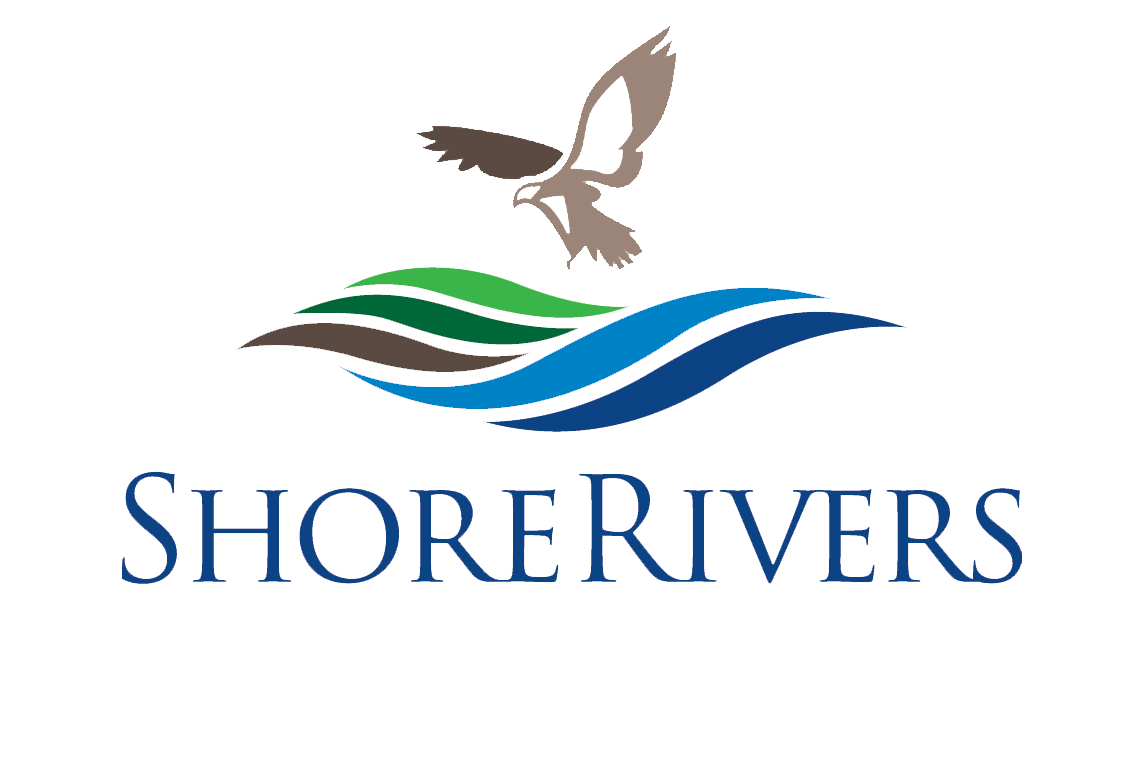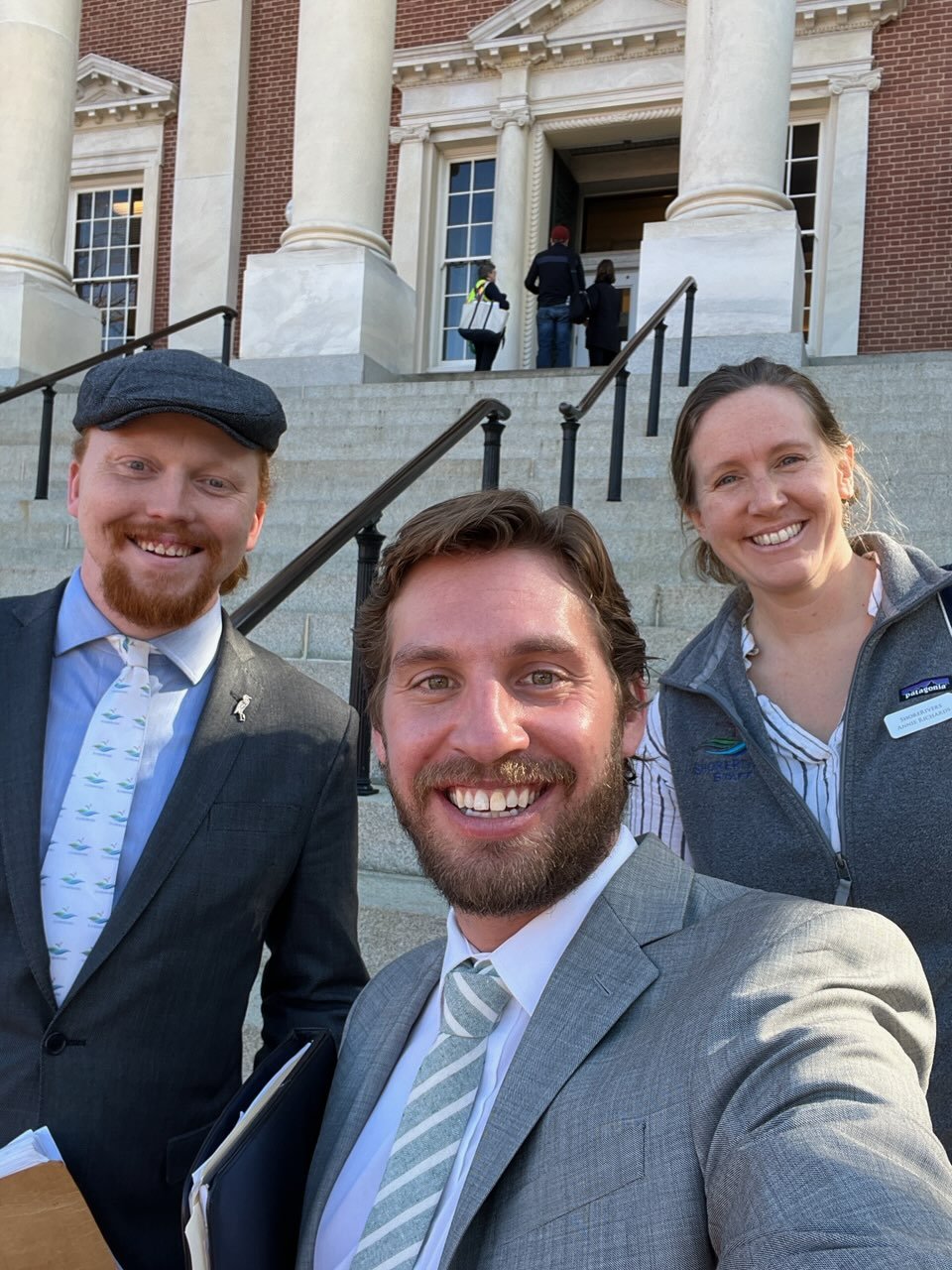ShoreRivers’ Sassafras Riverkeeper Zack Kelleher, Choptank Riverkeeper Matt Pluta, and Chester Riverkeeper Annie Richards are pictured in Annapolis during a day of advocating for legislation that supports clean rivers and healthy waterways.
April 11—also known as Sine Die day—marked the official end of session for Maryland’s General Assembly. After three years of virtual participation due to COVID precautions, ShoreRivers was able to return to the capital in-person again this year. The organization’s advocacy work, which is led by your Riverkeepers, is fundamental to creating system-wide change to protect our local rivers against the major issues that impact water quality on the Eastern Shore. As a leading voice for the waterways of the Eastern Shore, we amplify our work through local and state-wide coalitions, working groups, and other positions of influence.
Over the past 90 days, your Riverkeepers engaged with 50 environmental bills covering a wide array of topics including forestry education, PFAS monitoring, floodplain ordinance updates, invasive species control, underwater grass surveys, and more. After months of hard work and productive conversations, the following slate of bills has now passed from the assembly to Governor Wes Moore’s desk to await ratification (or veto):
ShoreRivers Priority Bills:
HB11/SB483 Private Well Safety Act of 2023
HB723/SB526 Forest Preservation and Retention
SB470 Land Conservation - Establishment of Goals and Programs (Maryland the Beautiful Act)
SB471 Water Pollution Control - Discharge Permits - Stormwater Associated with Construction Activity
Other Legislation Supported by ShoreRivers:
HB874/SB611 Office of the Attorney General Environment and Natural Resources Monitoring Unit - Establishment
HB289/SB282 Maryland Forestry Education Fund - Establishment
SB80 Blue and Flathead Catfish Finfish Trotline License - Establishment
HB62/SB62 Public Service Companies - Pollinator-Friendly Vegetation Management
HB63 Certified Local Farm and Chesapeake Invasive Species Provider Program -Establishment
SB434 Restorative Aquaculture Pilot Program
HB253/SB262 On-Farm Composting Facilities - Permit Exemption
HB0152 Urban Agriculture Grant Programs - Alterations
SB830 Environmental Health Systems Support Act of 2023
HB950/SB836 Maryland Native Plants Program
HB503 Greenspace Equity
HB30/SB7 On-Site Wastewater Services - Board, Fees, and Penalties
This year was a win for native plants and invasive species control in Maryland. ShoreRivers applauds the state’s focus on the natural environment as a means to benefit pollinator species and migratory birds, while protecting water quality and wildlife native to the Chesapeake Bay. Thanks to HB62, native plants and pollinator habitats will be prioritized and protected in public spaces and along state highways—capturing runoff from impervious surface before it enters local waterways. Bills like HB63 will incentivize the commercial market for harmful invasive fish such as snakeheads and blue catfish, which will help protect juvenile fish and crab populations in our waters.
Unfortunately, many priority bills for ShoreRivers that would have increased regulations and monitoring practices by the Maryland Department of the Environment did not pass this session. Under a new administration in its first year, your Riverkeepers are hopeful that state agencies will be compelled to take on this important work without a legislative mandate. Through the state budget bill, we see that the department is requesting funds for new staff to bolster its enforcement capacity.
Also of note this year is a bill that would add support, as well as accountability, to Maryland state agencies that have enforcement authority over environmental laws, titled HB874: Office of the Attorney General - Environment and Natural Resources Monitoring Unit. This bill will create an Environmental and Natural Resources Crimes Unit in the Office of the Attorney General to investigate and prosecute cases against those who violate environmental and natural resources laws. Each year, this unit would be required to report to certain entities in the state on all of its activities and any actions taken by the Maryland Departments of the Environment or Natural Resources in response to its findings and recommendations.
“If the state is ever to meet Chesapeake cleanup goals, enforcement for pollution violations must be a priority,” says Matt Pluta, ShoreRivers’ Choptank Riverkeeper and Director of Riverkeeper Programs. “We’re optimistic about the changes to be brought and commitments made by the administration of a new Maryland Department of the Environment. However, in the event that the department fails to do its job, the Attorney General’s Environmental Monitoring Unit should assist in holding polluters accountable.”
ShoreRivers implements restoration projects throughout our communities, engages volunteers in tree plantings and oyster growing, and reaches thousands of students each year through environmental education programs in local schools. The organization’s advocacy at the local, state, and federal level ensures that all of those endeavors can continue in order to support water quality improvements. Visit shorerivers.org to learn more about this important work.

